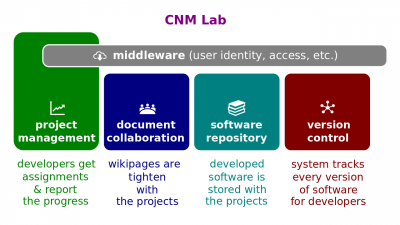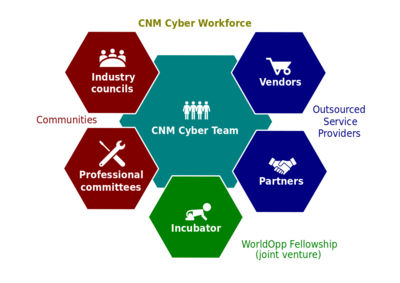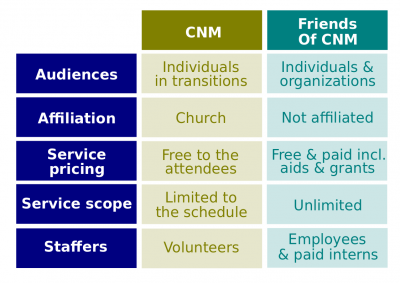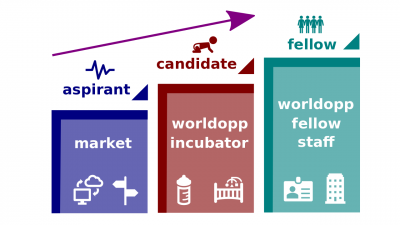Difference between revisions of "CNMC for Experience"
(→CNM Cyber Workforce) |
(→CNM Cabin Essentials) |
||
| Line 33: | Line 33: | ||
|6||'''[[Identity and access management]]''' ([[identity and access management|IAM]]), [[federated role]] | |6||'''[[Identity and access management]]''' ([[identity and access management|IAM]]), [[federated role]] | ||
|} | |} | ||
| − | |||
| − | |||
| − | |||
| − | |||
| − | |||
| − | |||
| − | |||
| − | |||
| − | |||
| − | |||
| − | |||
| − | |||
| − | |||
| − | |||
| − | |||
| − | |||
| − | |||
| − | |||
| − | |||
| − | |||
| − | |||
| − | |||
| − | |||
===CNM Lab Essentials=== | ===CNM Lab Essentials=== | ||
Revision as of 01:45, 20 April 2020
CNM Cyber for Experience (hereinafter, the Session) is a learning session introducing its participants to CNM Work Suite and work at CNM Cyber. The Session consists of three lessons, each of which is made of three to five lesson parts, called lectios. Every lectio includes a presentation and a quiz. The official version of the Session is published at CNM Cert. Its materials are also published at CNM Page, CNM Talk, CNM Wiki, and various channels for marketing and convenience purposes.
The Session is the final of four sessions of the CNM Cyber Welcome Course.
Contents
Outline
The predecessor activity is the CNM Cyber for Action.
CNM Cabin Essentials
- Main wikipage: CNM Cabin Essentials
CNM Lab Essentials
- Main wikipage: CNM Lab Essentials
- CNM Lab. The combination of project management, version control, and file-sharing systems of CNM Cyber that is delivered to its end-users as a service.
- Source code. According to the Linux Information Project, "the version of software as it is originally written (i.e., typed into a computer) by a human in plain text (i.e., human readable alphanumeric characters)." This code commonly include comments and is specially designed to facilitate the work of computer programmers, who specify the actions to be performed by a computer to indicate their intentions.
- Web document. A document that defines another document to target software applications. Web documents are widely used in the Internet. For instance, web browsers use web documents to display webpages to their end-users. Search engine robots use web documents to collect data about those webpages. Those contemporary email clients that are mobile apps use web documents to display emails without web browsers. To those end-user applications that are used to view documents of various formats, web documents may represent documents in the PDF format, graphic elements of image files, etc.
- DevOps. An engineering practice and a set of concepts based on that practice that aim at unifying new product development (the Dev part) and operations (the Ops part). The primary feature of DevOps is to strongly advocate automation and monitoring at all steps of the project such as integration, testing, releasing to deployment, and infrastructure management. DevOps aims at shorter development cycles, increased deployment frequency, more dependable releases, in close alignment with business objectives. Functions of DevOps office staffers can be compared with those of project management office (PMO) in a traditional project management framework.
- Project management system. Any system for project management. Usually, the System is built using project management software, which tends to be a combination of end-user applications specifically designed to aid with planning and controlling project costs and schedules.
- Version control system. The system that is set for version control. The system controls versions or revisions of documents, source codes, files, groups of files, collections of data, and/or other resources.
- File-sharing system. Any software system that enables its users to upload, store, and download files on the Internet.
- Software application. Any digital construct that is installed, instantiated and executed on a computing device, specifically for the purpose of assisting in the capture, creation, manipulation, tracking, management, and reporting of specified data.
- Software repository. A storage location from which software packages may be retrieved and installed on a computer.
- Cyber-security. The practice and a set of concepts based on that practice that are designed to protect computers, data, and networks from potential attacks or unauthorized access.
- Encryption. A method of encoding data so that it is unreadable to parties without a method of decryption.
- SSL certificate. The system document that (a) is issued by a certificate authority (CA), (b) is based on the Secure Sockets Layer (SSL) protocol, and (c) installed on a web server to allow for a secure connection between this web server and any web browser. Contemporary SSL certificates also support the Transport Layer Security (TLS) protocol.
CNM Cyber Workforce
- Main wikipage: CNM Cyber Workforce
- CNM Cyber Team. The department of the Career Network Ministry (CNM) that administers computer services such as the website at https://careernetworkministry.org, technology skills training for CNM patrons, CNM PMP Bootcamp, and those pages of CNM Wiki that are related to CNM and CNM Cyber. Members of this department are volunteers and are paid no wages or salaries.
- Career Network Ministry (CNM). The outreach team of McLean Bible Church in Northern Virginia, which goal is to provide caring support to individuals during career transitions. The team welcomes any patron from any faith, or no faith, to take full advantage of its services, which include interviewing skills building, resume writing, elevator pitch, job marketing, financial planning, and various types of networking. All services of CNM are delivered by volunteers and are free to all the recipients of these services.
- Volunteer. A person who does something, especially helping other people, willingly and without being forced or paid to do it.
- WorldOpp Fellow Staff. The executive department of Friends Of CNM. The Department runs CNM Cloud and CNM Cyber, It consists of WorldOpp fellows, sponsors WorldOpp incubator, and is overseen by the CNM Cyber Community Board.
- Friends Of CNM. A non-government non-political non-religious group of legal entities, every of which is called a CNM friend, that provides the Career Network Ministry (CNM) with CNM Cyber at no cost to the CNM and, furthermore, provides patrons of the CNM with those services that the CNM does not offer. Every CNM friend joins into or separates from the group on a declarative basis. Friends Of CNM's structure is organic. Its distinct areas are:
- WorldOpp Team. Every team member, either a fellow or candidate, of adult age is usually a CNM friend;
- Outsourced service providers, contractors and partners. They are not required, but tend to be CNM friends; and
- CNM Cyber communities. Any friend can create a new community or apply for joining any existing community, but every community may establish its own policies including rules for joining and separating.
- Employee. Any individual whom an employer has hired to exchange his or her worktime for employee compensation. In the United States, this compensation that must include either wages or a salary.
- Independent contractor. A contractor, who is an individual and who provides another legal entity with his or her products, usually, services. The contractor's products are specified under terms of a contract or a verbal agreement.
- Friends Of CNM. A non-government non-political non-religious group of legal entities, every of which is called a CNM friend, that provides the Career Network Ministry (CNM) with CNM Cyber at no cost to the CNM and, furthermore, provides patrons of the CNM with those services that the CNM does not offer. Every CNM friend joins into or separates from the group on a declarative basis. Friends Of CNM's structure is organic. Its distinct areas are:
- Pre-entry-level job (student job). An employment that assumes that the employee hasn't possessed yet a complete set of KSAs that the position typically requires. Usually, the incumbent of that job is paid a portion of what the fully-qualified employee would be paid. Often, the incumbent of that job is expected to learn while on the job. His or her payment casually increases as his or her qualifications increase.
- CNM IT Project Coordinator. A volunteer staffer of the CNM IT Office.
- CNM Cloud Project Coordinator. An employee or independent contractor who administratively supports, virtually and/or onsite, CNM Cloud Project and/or owns CNM Cabin, Cert, Lab, Linkup, Mail, Page, Servers, Social, Venture, Talk, Tube, Wiki, and/or its components.
- WorldOpp incubator. An environment for the care, protection, and growth of those WorldOpp candidates who would like to become WorldOpp fellows.
- Apprentice. Any employee who is not fully qualified to perform his or her workload, but agreed to work usually for a part of the fully-skilled worker compensation under the condition of educational assistance to gain the needed work-related competence.
- Career ladder (corporate ladder). A metaphor for job promotion, which describes the upward career progression through career levels from entry-level jobs and up to higher levels of pay, skill, responsibility, or authority. This metaphor doesn't reflect those career progressions that differ from the upward one.
- Careerprise bizopp (Careerprise business opportunity). An opportunity for a business to become a Careerprise contractor and/or Careerprise partner.
- Careerprise contractor. An independent contractor whom Friends Of CNM hires directly.
- Careerprise partner. A legal entity that takes part in undertakings with Friends Of CNM in order to share those risks and profits that are related to those undertakings.
- Careerprise conference. A CNM Cyber event organized in order to clarify requirements and discuss challenges that Careerprise contractors and/or Careerprise partners face.
- CNM Work Suite. A collection of two CNM Cyber services that are designed to accommodate one's professional experience.
- Departmentalization. The basis by which organizational units are created and by which jobs in an enterprise are grouped together.
- Product owner. An individual, group, and/or organization that provides a product developer or developers with the vision of the product to be developed, improved, sustained, or retired.
- Area of responsibility (AOR). A pre-defined area of interest, influence, and/or operations assigned to an organizational unit such as a workteam. The United States Armed Forces assign AORs to allow a single commander to exercise command and control of all military forces in the AOR regardless of their branch of service.
No successor session exists in the CNM Cyber Welcome Course. The CNM Cyber Orientation is the next course.





